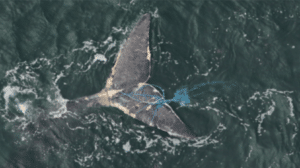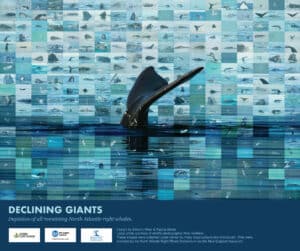Lobster fisheries now on Seafood Watch’s red list for their impact on right whales

Photo credit: Clearwater Marine Aquarium Research Institute, taken under NOAA research permit 18786.
By Simon L’Allier, Marine Mammal Coordinator, Sierra Club Canada
A new article came out recently about the North Atlantic right whales, specifically discussing Seafood Watch’s new ratings on fisheries that are still using pots, traps and gillnets for lobster fishing. These new ratings now suggest to “avoid” lobsters from these fisheries and to “find alternatives”.Seeing the reactions of those lobster fishermen and in the comments of the article, it made me feel a bit conflicted. On the one hand, it is clear (and there is lots of data to prove) that entanglements from fixed-gear fisheries, which is what is used for lobster and snow crab fishing, are the biggest threat to North Atlantic right whales’ survival, along with vessel strikes. However, I don’t think it is fair to fully put the blame on the fishermen, who are dependent on the industry and have relied on it as a source of income for generations.
Many fisheries in the Gulf of Saint-Lawrence and elsewhere in the U.S. are actively working to test a possible transition to whalesafe fishing gear, using ropeless gear. The government of Canada has committed to at least a transition to low-breaking strength rope by the next fishing season in 2023, although there is debate whether this will be enough to save the species. Of course, we fully support this transition, as it is the only way we can hope for the whales to recover.
Both governments in the U.S. and Canada, as well as the industry, all need to increase their commitment and accelerate action to protect the critically endangered right whales. I believe putting these industries on a red list should be a last resort. However, with only 336 whales estimated to remain in the wild, it begs the question of when we consider being out of time…? Governments and industry need to make this transition a priority if we are to ensure the survival of the North Atlantic right whales and, as this listing indicates, protect the health of fisheries and coastal communities.
Have a look at our North Atlantic right whale art piece we created and let us know what you think!

Mural of the Last Remaining North Atlantic Right Whales
